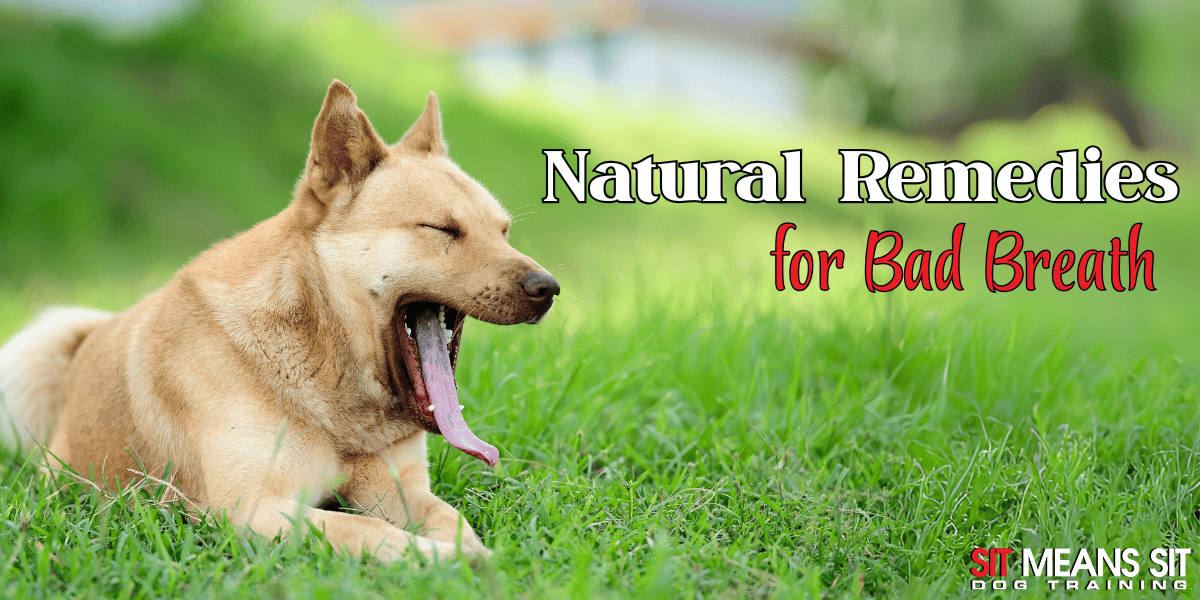If you’ve ever recoiled after a big, wet kiss from your pup, you’re not alone. Bad breath is one of those dog problems that’s hard to ignore, especially when your furry friend is always close by. While it’s easy to joke about “doggy breath,” persistent odor can be a sign of something more serious. Thankfully, there are plenty of natural remedies that can help freshen Fido’s breath.
Rule Out Any Serious Health Concerns
Before exploring natural remedies for your dog’s bad breath, make sure you rule out any more serious issues. In some cases, bad breath can signal something going on deeper inside your dog’s body. Conditions like dental infections, kidney disease, or gut imbalances might be the real reason your dog’s breath is less than pleasant.
That’s why it’s always smart to schedule a quick vet visit if you notice new or worsening odor, especially if it comes along with other symptoms like drooling, appetite changes, or unusual behavior. Once you’ve ruled out serious causes, you can safely move forward with natural ways to keep your dog’s breath in check.
Brush Fido’s Teeth Regularly
Brushing your dog’s teeth might sound like a hassle, but it really is the most effective way to control bad breath. Just like us, dogs get plaque buildup on their teeth, which turns into tartar and traps bacteria that lead to odor. This is why it’s essential to know how to brush your dog’s teeth properly and to make it a habit.
To brush Fido’s teeth, start slowly by letting your pup get used to having their mouth touched. A soft dog-safe toothbrush and a tasty canine toothpaste can go a long way in making this a more enjoyable process. Even brushing just a few times a week can make a noticeable difference. And if your dog absolutely refuses, there are also dental wipes and powders you can try in the meantime.
Give Your Dog Probiotics
Most people think of probiotics as a gut health tool, but they can also support your dog’s oral hygiene. A healthy balance of good bacteria can help crowd out the odor-causing germs that thrive in the mouth.
You can find probiotics formulated for dogs in various forms, including chews, powders, and even dental treats. Some pet owners also give their dogs small amounts of plain yogurt with live cultures as a natural option. Just be sure to check with your vet before adding anything new to your pup’s diet.
Keep Fido Properly Hydrated
Water is one of the simplest and most powerful tools for fresher breath. When dogs are dehydrated, their saliva production drops, which means bacteria and food particles are more likely to linger in the mouth. Since dehydration can cause numerous health issues, it’s essential to know the signs of dehydration in dogs.
To prevent bad breath caused by dehydration, make sure your dog has constant access to clean, fresh water. If your pup isn’t a big drinker, try placing water bowls in different rooms or adding a splash of low-sodium broth to make it more enticing. It might take time to make drinking water a habit, but a well-hydrated dog will have fresher breath and better overall health.
Add Celery to Your Dog’s Diet
Celery might not be the first thing you think of when it comes to dog treats, but it’s surprisingly useful for reducing stinky dog breath. This crunchy veggie is full of moisture and fiber, both of which help support clean teeth and better-smelling breath.
As your dog chews on celery, it scrubs their teeth and encourages saliva flow, which helps wash away debris and bacteria. It’s also low in calories, making it a great snack for pups who need a little something extra between meals. Just be sure to cut it into small, manageable pieces and offer it in moderation.
Use Canine Dental Chews and Toys
Dental chews and textured toys can be a fun and easy way to support oral hygiene. As your dog gnaws on them, the rough surfaces help scrape off plaque and food particles. Not only do dental chews and toys help clean canine teeth, but they also keep pups mentally engaged, making this option a win-win!
When shopping, look for chews and toys designed specifically for dental health. They should be the right size for your dog and made from safe materials. Avoid anything too hard, like bones or antlers, which could crack teeth. Always keep an eye on your dog during chew sessions to prevent accidental choking or swallowing of large pieces.
Add Coconut Oil to Your Pup’s Routine
Coconut oil is a favorite among natural pet lovers, and for good reason. When used in small amounts, it can help improve digestion, boost the immune system, and freshen breath. Some dog owners mix a small spoonful into their dog’s food, while others use it to gently brush their dog’s teeth. Its natural antibacterial properties can help fight odor-causing bacteria in the mouth. Just remember to start with a small amount and monitor your dog’s reaction, as too much can cause stomach upset in some pups.
Doggy breath might be common, but that doesn’t mean you have to live with it. With a little extra care and a few natural tricks, you can help keep your pup’s mouth clean and their breath bearable—maybe even fresh! Whether it’s brushing more often, tossing them a celery stick, or trying out a new probiotic, small changes can add up to big results. Just don’t forget that a quick check-in with your vet is the first step to making sure there’s nothing more serious going on.

